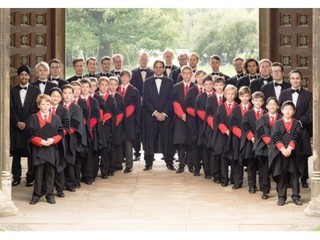|
Back
For England and St. John’s New York
Saint Thomas Church
04/05/2016 -
Ralph Vaughan Williams: Mass in G minor
James Burton: O Thoma
Jonathan Harvey: The Annunciation
Jonathan Dove: Gloria (Missa Brevis)
William Byrd: Civitas Sancti Tui
Henry Purcell: Remember not, Lord, our offences – Rejoice in the Lord alway
William Harris: Faire is the heaven
C. Hubert H. Parry: Hear my words, ye people
Dietrich Buxtehude: Praeludium in E, Bux WV 141
Edward Elgar: Imperial March, Opus 32
Joseph Wicks, Glen Dempsey (Organ)
The Choir of St. John’s College, Cambridge, Andrew Nethsingha (Conductor, Director of Music)

St. John’s Choir (© Courtesy of the Artists)
”How then can mortall tongue hope to expresse/The image of such endlesse perfectnesse?”
Edmund Spencer, from Faire is the Heaven
The words are from one of the 11 British mainly Anglican selections rendered by the St. John’s Choir from Cambridge. And while “perfectnesse” is apt to be dull, this ensemble was lighter, totally on pitch, and far more festive than that word would imply.
Then again, this group from the college in Cambridge has had over 350 years to perfect their art. The boys and men (women, as the Bible commands, would be disallowed) followed that Tudor master, William Byrd but just a few decades, while Henry Purcell had just been born, in 1659, when auditions for the first St. John’s Choir, during the 1660’s were being held.
Both Byrd and Purcell were represented here. And it was a joy to hear Purcell with his original ensemble of boys and men, solos and choristers alike. Rejoice in the Lord Alway was Purcell at his most glorious. A trio of tenor, baritone and counter-tenor, working in antiphonal harmonies with the boys choir and the entire St. John’s Choir is lovely enough. But within the spacious confines of St. Thomas Church, one might have had an idea how that sounded in a British cathedral of the time.
Then again, we had that special color of the St. John’s Choir. This was no men’s ensemble with boys added. We had 17 trebles–mainly, it would seem, boys–as against four counter-tenors and a mere half-dozen basses and tenors. Thus, we had that lightness, the hue of youth, and high vibrato-free sounds which soared up to the St. Thomas buttresses.
For the most part, the Anglican coda did reflect upon the music. The emotional tribulation of William Byrd’s Civitas Sancti Tui was created by the imitative voices, one after the other. (Byrd was actually a Catholic, but the High Church Queen Elizabeth was so entranced that he became “her” composer.)
Yet the opening piece, Vaughan Williams’ G Minor Mass had the same style of imitation, an obvious heir to the Tudor master. Some of that was derivative, but other parts–the slow introduction to the Gloria and the extremely moving Agnus Dei–were personal, even urgent, and sung with bounteous urgency.
I was not terribly impressed with the other 20th Century music, though the compositions showed deft workmanship, quiet spirituality.
The one exception was startlingly above that music. This was Jonathan Harvey’s short but gloriously trenchant Annunciation. Like Henry Purcell, Mr. Harvey gave truth to the adage that “The good die young.” Yet this early piece of Mr. Harvey, who later turned to Indian mysticism, was mystical, almost phantasmal, set to haunting words by Edwin Muir.
The music was melodic, as English church music should be, yet the amazing text of Earth meeting heaven, was set to an intense crescendo–and then brought to earth and heaven, through the most exquisite final chords.
For this alone, the concert was a great one.
Most of the congregation...er, audience, came for the singers, but the fine grand organ of St. Thomas Church was brought into grandeur by two organists, playing Buxtehude and Elgar. And as an extra non-English encore, the young dynamic conductor Andrew Nethsingha had his group sing Anton Bruckner’s Christus factus est.
The finale here was a reflection of the opening Vaughan Villiams Mass by that most Victorian of all composers, Hubert Parry. He is virtually unknown in America, but he wears the crown of huge Victorian/Edwardian epics, over-shadowed by the more inspired Edward Elgar. And while he might be outmoded today and parodied in his own day by George Bernard Shaw, the Parry piece, Hear My Words was sung with great enthusiasm–both in the harmonies and the effective unison work in one verse. If nothing else, it showed there will always be an England, even in the middle of Manhattan’s fashionable Fifth Avenue.
Harry Rolnick
|